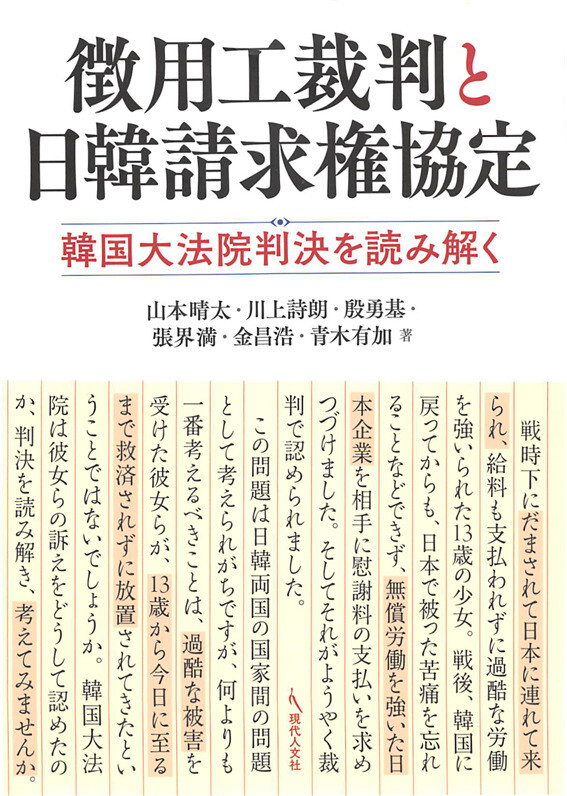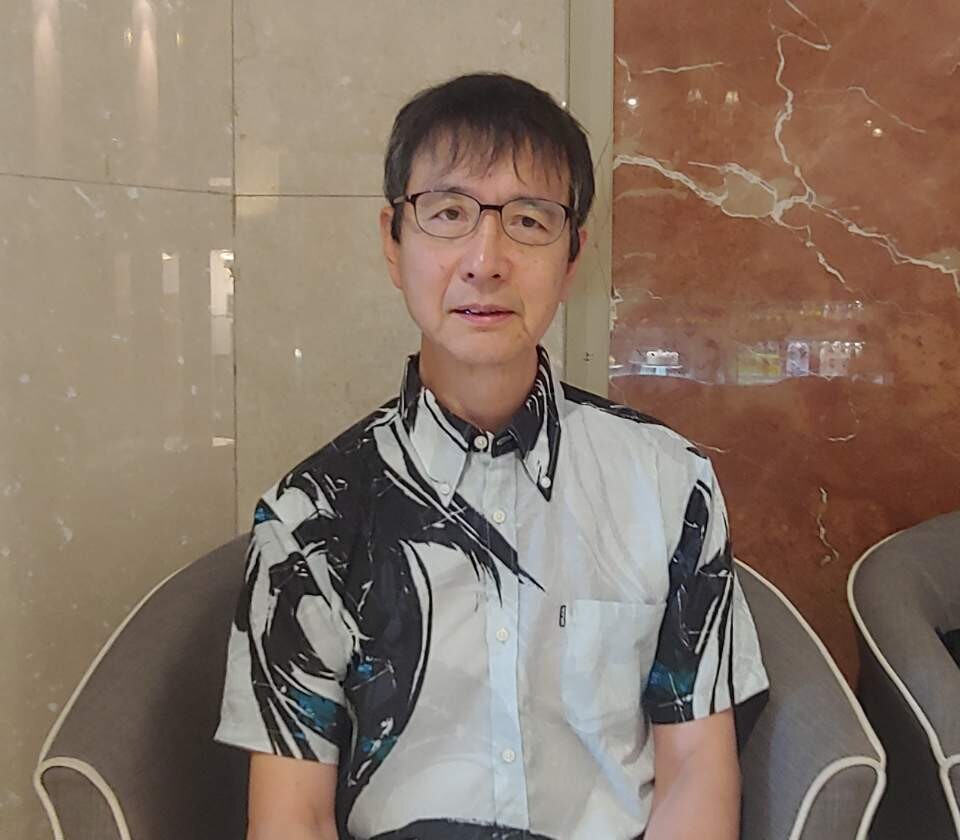hankyoreh
Links to other country sites 다른 나라 사이트 링크
Japanese attorneys publish book on S. Korean forced labor victims

Japanese attorneys have published a book in Japan analyzing the South Korean Supreme Court ruling that awarded damages to Korean victims of forced labor during the Japanese colonial occupation. Through their book, these attorneys hope to correct prejudice and misunderstanding in Japanese society about the forced labor issue and the two countries’ agreement to settle outstanding claims. This is the first book to be published in either country that examines the significance of the October 2018 ruling from a variety of angles.
“The Forced Labor Ruling and the Japan-South Korea Claims Agreement: Reading and Interpreting the South Korean Supreme Court’s Ruling” was released by Japanese publisher Gendai Jinbun-sha at the end of August. The book was written for a general readership by six lawyers who belong to the Japan Federation of Bar Associations. Three of the writers are Japanese, including 66-year-old Seita Yamamoto, who has long represented Korean victims of forced labor in their damages lawsuits against the Japanese government; the other three are Korean-Japanese, including Kim Chang-ho, a leading activist for the rights of Korean-Japanese, also called Zainichi Koreans.
During an interview with the Hankyoreh in Seoul on Aug. 31, Yamamoto said that he made up his mind to write the book “to let more people know about the truth, since they’re not getting that from the Japanese government or the press.”
“Most Japanese think the current conflict between South Korea and Japan was started by South Korea about the Supreme Court ruling. But in fact, the conflict was instigated by Japan’s conservative administration in order to boost its approval rating,” the attorney said.

Yamamoto stressed that the message he wanted to convey is that the issue of compensating forced laborers “is not a political matter for two states to dispute but a matter of human rights for the victims, who have been litigating the issue for a quarter century.”
The four chapters of the book use a Q&A format to make the content as readable as possible. The first chapter introduces the substance of the Supreme Court’s ruling and describes the legal battle that the victims of forced labor have been waging in both Japan and South Korea for more than two decades. The book makes it clear that Koreans were illegally and physically forced to provide labor both by the conscription system and the Korean Women’s Volunteer Labour Corps, attacking the Japanese government’s argument that Koreans provided their labor on a voluntary basis.
The book also rebuts the argument advanced by the Japanese government in opposition to the Supreme Court’s decision that the individual right to make claims expired with a 1965 agreement that settled outstanding claims between South Korea and Japan. “There are many people in Japan, and even in the Japanese press, who think [the compensation issue] was completely settled by the claims agreement and who assume that South Korea has gone back on its word. They say that South Korea is responsible for compensation because President Park Chung-hee used the funds provided by the claims agreement for other purposes. But prior to the Abe administration, even the Japanese government has maintained that the claims agreement didn’t trigger the expiration of the individual right to make claims,” Yamamoto said.
The book focuses on the search for a solution, such as the proposal made by the South Korean government for Japanese and South Korean companies to pool their resources to set up a compensation fund. “If [the Abe administration] has no intention of offering a sincere apology, it shouldn’t block Japanese companies from fulfilling their duty to provide compensation. What we need is a victim-centered approach,” Yamamoto said.
The book voices frustration about how the forced labor trial was delayed under the leadership of former Supreme Court Chief Justice Yang Sung-tae. “A judicial scheme in South Korea prevented the trial from moving forward. As a result, two of the victims of forced labor at Nachi-Fujikoshi who were pursuing a lawsuit in Japan passed away without seeing the outcome of the trial.”
“I got the impression that the South Korean government didn’t really step in until local companies were also being harmed by the export controls that Japan imposed after the Supreme Court’s decision. But the crux of the issue is human rights for the victims. That’s something I hope South Korea and Japan won’t forget,” Yamamoto said.
By Jang Ye-ji, staff reporter
Please direct comments or questions to [english@hani.co.kr]

Editorial・opinion
![[Column] When ‘fairness’ means hate and violence [Column] When ‘fairness’ means hate and violence](https://flexible.img.hani.co.kr/flexible/normal/500/300/imgdb/original/2024/0516/7417158465908824.jpg) [Column] When ‘fairness’ means hate and violence
[Column] When ‘fairness’ means hate and violence![[Editorial] Yoon must stop abusing authority to shield himself from investigation [Editorial] Yoon must stop abusing authority to shield himself from investigation](https://flexible.img.hani.co.kr/flexible/normal/500/300/imgdb/original/2024/0516/4417158464854198.jpg) [Editorial] Yoon must stop abusing authority to shield himself from investigation
[Editorial] Yoon must stop abusing authority to shield himself from investigation- [Column] US troop withdrawal from Korea could be the Acheson Line all over
- [Column] How to win back readers who’ve turned to YouTube for news
- [Column] Welcome to the president’s pity party
- [Editorial] Korea must respond firmly to Japan’s attempt to usurp Line
- [Editorial] Transfers of prosecutors investigating Korea’s first lady send chilling message
- [Column] Will Seoul’s ties with Moscow really recover on their own?
- [Column] Samsung’s ‘lost decade’ and Lee Jae-yong’s mismatched chopsticks
- [Correspondent’s column] The real reason the US is worried about Chinese ‘overcapacity’
Most viewed articles
- 1China calls US tariffs ‘madness,’ warns of full-on trade conflict
- 2[Column] US troop withdrawal from Korea could be the Acheson Line all over
- 3[Editorial] Yoon must stop abusing authority to shield himself from investigation
- 4[Column] When ‘fairness’ means hate and violence
- 5[Column] How to win back readers who’ve turned to YouTube for news
- 6US has always pulled troops from Korea unilaterally — is Yoon prepared for it to happen again?
- 7[Book review] Who said Asians can’t make some good trouble?
- 8Naver’s union calls for action from government over possible Japanese buyout of Line
- 9Could Korea’s Naver lose control of Line to Japan?
- 10[Editorial] Korea must respond firmly to Japan’s attempt to usurp Line